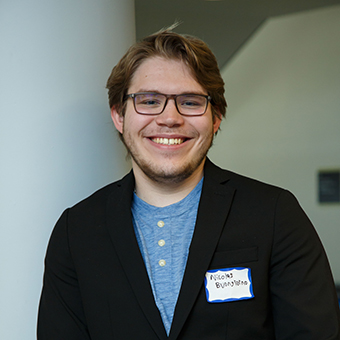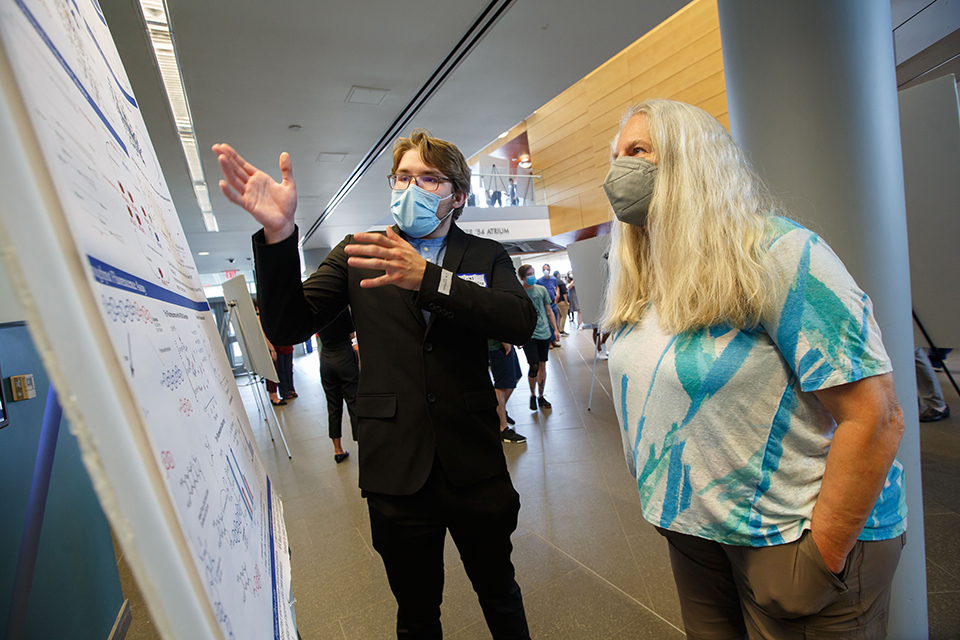Nicolas Buongiorno
Kern Lab
Department of Biochemistry
Brandeis University
The Directed Evolution of Patellamide Macrocyclases for Producing Novel Macrocycles as Potential Drugs
 Macrocyclic peptides are a class of biological molecules that can function as useful therapeutics, as they modulate protein-protein interactions more effectively than small molecules. In addition, macrocyclic peptides may be more equipped to penetrate the cell membrane and possess a greater resistance to proteolysis in contrast to their linear equivalents.
Macrocyclic peptides are a class of biological molecules that can function as useful therapeutics, as they modulate protein-protein interactions more effectively than small molecules. In addition, macrocyclic peptides may be more equipped to penetrate the cell membrane and possess a greater resistance to proteolysis in contrast to their linear equivalents.
The aim of my project is to perform directed evolution on the cyanobacterial macrocyclase PatGmac and its ancestors, to study the evolvability of modern and ancestral enzymes. We hypothesize that ancestors are more evolvable due to their elevated thermostability and lowered substrate specificity. This stability and promiscuity increases the probability to accommodate mutations that could be detrimental to more evolved, substrate-specific macrocyclases. Hence, directed evolution endeavors on the ancestors may yield an increased number of functional variants, in contrast to directed evolution starting on their less evolvable, modern counterparts.
To screen a 106 library for enzymes with improved activity, a fluorescence-based high-throughput assay is required. We tested an assay employing a fluorophore, which forms a quenching FRET pair with tryptophan upon N-terminal peptide labeling. This allows us to detect a free and unreacted N-terminus, since PatGmac-catalyzed N-to-C cyclization results in the loss of the reactive terminal amine. Time-course tryptophan fluorescence detection experiments and mass spectrometry indicated labelling of the linear peptide, VTACITWPAYDG by the fluorophore, Alexa Fluor 350. Modern PatGmac has not yet been kinetically characterized. Therefore, reaction quenched time-course samples of a few different variants of PatGmac acting on the substrate, VTACITWPAYDG, were performed using a discontinuous HPLC assay to obtain steady state kinetics data. Kinetic characterization of PatGmac and a few of its variants demonstrated promising catalytic efficiency.
The future work on the project includes resurrecting the PatGmac ancestors and kinetically characterizing them with HPLC, as well as developing an improved HPLC method for macrocyclization reaction component peak separation.
Personal Statement
Working in the Kern Lab for the past year has been a truly rewarding and exciting experience. As an aspiring biochemistry major, I have had many experiences with different types of lab courses in college and K-12. Those courses all complemented the theoretical material covered in the corresponding classes well and helped me understand why what we were learning was important. However, it was not until working in the Kern Lab part-time over the academic year and full-time over the summer, that I was able to consistently see why the material we learn in class is relevant and has applications to what we do in science. Utilizing knowledge consistently in the lab helped reinforce my understanding of those concepts as well as helping me to learn concepts that I had not known previously. I also found that this experience has excited me even more about science and about the field that I am entering. I have seen first-hand how interesting the work done in labs can be, as well as how beneficial it can be for the advancement of human society. I want to thank all my teachers for helping me know what I now know in STEM, Professor Kern for letting me work in her lab, Hannes Ludewig for being a great mentor and partner, the rest of my lab mates for making me feel welcome since my first day, and the M.R. Bauer Foundation Summer Undergraduate Research Fellowship for helping fund my research this summer.
Giving Back Reflection
I have seen first-hand how interesting the work done in biochemistry and other general research labs can be, as well as how beneficial they can be for the advancement of human society and safety. Working every day in the lab and doing the experiments obviously do not directly assist those in need, but the goal is to work towards creating or discovering something from those experiments that can help with such clinical advancement. As someone who has been on prescribed medications my whole life to help with my main diagnosed disorders, such as ADHD and generalized anxiety disorder, I want to be able to give back in my future to others who are suffering from certain diseases and disorders. I hopefully will be able to discover or develop drugs to help combat a specific disorder or disease, as is the case with my current project that I worked on over the summer.
